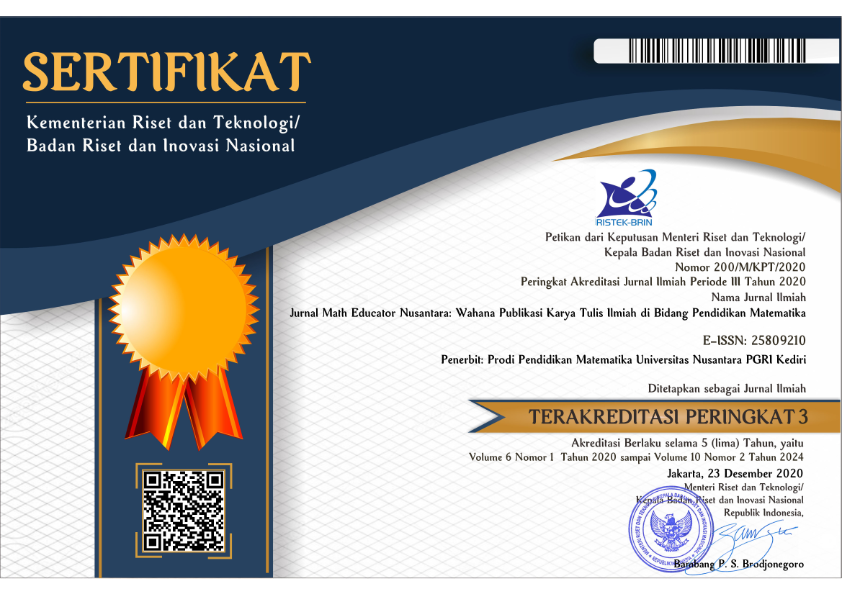Do differences in measured mathematical abilities moderate the effectiveness of the realistic mathematics education approach? Meta-analysis studies
DOI:
https://doi.org/10.29407/jmen.v7i1.15736Keywords:
Realistic Mathematics Education, Measured variables, Meta-analysis, Effect sizesAbstract
Evidence-based research on the effect of Realistic Mathematical Education (RME) has been conducted. However, whether differences in the measured variables alter the studies' effect sizes have not been explored. To fill this gap, it is necessary to conduct a meta-analysis study that can summarize the evidence for the effect of RME and analyze how the differences in the measured variables are associated with the effect size (ES) of the study. The research sample is an individual study of the effect of RME on various mathematical abilities identified from the ERIC database, the Scopus database, and Google Scholar. Based on the inclusion requirements, 54 independent samples from 38 individual studies were included in the analysis with a total of 6140 students included. The estimation method uses a random-effect model, and the Comprehensive Meta-Analysis (CMA) software is used as a data processing tool. The results of the analysis showed that the ES of the study was 0.97. This shows that overall, the use of RME has a significant effect on students' mathematical abilities. The moderator analysis results explain that the differences in the measured variables moderate the implementation of RME. These findings contribute to the implementation of RME in classrooms and the further development of RME by considering the categories of abilities being measured.
References
Arik, S., & Yilmaz, M. (2020). The effect of constructivist learning approach and active learning on environmental education: A meta-analysis study. International Electronic Journal of Environmental Education, 10(1), 44–84. https://files.eric.ed.gov/fulltext/EJ1239355.pdf
Borenstein, M., Hedges, L. V, Higgins, J. P. T., & Rothstein, H. R. (2009). Introduction to Meta-Analysis (Issue January). A John Wiley and Sons, Ltd., Publication. https://doi.org/10.1002/9780470743386
Borenstein, M., Hedges, L. V, & Rothstein, H. R. (2009). Introductionto Meta-Analysis (Issue January). John Wiley & Sons.
Chen, C. H., Shih, C. C., & Law, V. (2020). The effects of competition in digital game-based learning (DGBL): a meta-analysis. Educational Technology Research and Development, 68(4), 1855–1873. https://doi.org/10.1007/s11423-020-09794-1
Çiftçi, Ş. K., & Yıldız, P. (2019). The Effect of Self-Confidence on Mathematics Achievement : The Meta- Analysis of Trends in International Mathematics and Science Study. International Journal of Instruction, 12(2), 683–694. https://doi.org/10.29333/iji.2019.12243a
Cohen, L., Manion, L., & Morrison, K. (2018). Research Methods in Education (8th ed.). Routledge Taylor & Francis Group.
Franzen, M. (2020). Meta-analysis. In H. V. Zeigler & T. . Shackelford (Eds.), Encyclopedia of Personality and Individual Differences (p. 5925). Springer, Cham. https://doi.org/10.1007/978-3-319-24612-3_1326
Harwell, M. (2020). Growth in the Amount of Literature Reviewed in a Meta-Analysis and Reviewer Resources. Mid-Western Educational Researcher, 32(1), 31–47.
Higgins, S., & Katsipataki, M. (2015). Evidence from meta-analysis about parental involvement in education which supports their children’s learning. Journal of Children’s Services, 10(3), 280–290. https://doi.org/10.1108/JCS-02-2015-0009
Hirza, B., Kusumah, Y. S., Darhim, & Zulkardi. (2014). Improving intuition skills with realistic mathematics education. Journal on Mathematics Education, 5(1), 27–34. https://doi.org/10.22342/jme.5.1.1446.27-34
Juandi, D., Kusumah, Y. S., Tamur, M., Perbowo, K. S., Siagian, M. D., Sulastri, R., & Negara, H. R. P. (2021). The Effectiveness of Dynamic Geometry Software Applications in Learning Mathematics: A Meta- Analysis Study. International Journal Interactive Mobile Technologies, 15(02), 18–37. https://doi.org/10.3991/ijim.v15i02.18853
Juandi, D., Kusumah, Y. S., Tamur, M., Perbowo, K. S., & Wijaya, T. T. (2021). A meta-analysis of Geogebra software decade of assisted mathematics learning : what to learn and where to go? Heliyon, 7(5), e06953. https://doi.org/10.1016/j.heliyon.2021.e06953
Juandi, D., & Tamur, M. (2020). Pengantar Analisis Meta (1st ed.). UPI PRESS.
McHugh, M. L. (2012). Lessons in biostatistics interrater reliability : the kappa statistic. Biochemica Medica, 22(3), 276–282. https://doi.org/10.11613/BM.2012.031
Nawijn, F., Ham, W. H. W., Houwert, R. M., Groenwold, R. H. H., Hietbrink, F., & Smeeing, D. P. J. (2019). Quality of reporting of systematic reviews and meta-analyses in emergency medicine based on the PRISMA statement. BMC Emergency Medicine, 19(1), 1–9. https://doi.org/10.1186/s12873-019-0233-6
Ndiung, S., Dantes, N., Ardana, I. M., & Marhaeni, A. A. I. N. (2019). Treffinger Creative Learning Model with RME Principles on Creative Thinking Skill by Considering Numerical Ability. International Journal of Instruction, 12(3), 731–744. https://doi.org/10.29333/iji.2019.12344a
Özdemir, B. G. (2017). Mathematical Practices in a Learning Environment Designed By Realistic Mathematics Education: Teaching Experiment About Cone and Pyramid. European Journal of Education Studies, 3(5), 405–431. https://doi.org/10.5281/zenodo.546599
Paloloang, M. F. B., Juandi, D., Tamur, M., Paloloang, B., & Adem, A. M. G. (2020). Meta Analisis: Pengaruh Problem-Based Learning Terhadap Kemampuan Literasi Matematis Siswa Di Indonesia Tujuh Tahun Terakhir. AKSIOMA: Jurnal Program Studi Pendidikan Matematika, 9(4), 851–864. https://doi.org/10.24127/ajpm.v9i4.3049
Pigott, T. D. (2012). Advances in Meta-Analysis. In Statistics for Social and Behavioral Sciences. Springer New York Dordrecht Heidelberg London. https://doi.org/10.1007/978-1-4614-2278-5
Pigott, T. D., & Polanin, J. R. (2020). Methodological Guidance Paper: High-Quality Meta-Analysis in a Systematic Review. Review of Educational Research, 90(1), 24–46. https://doi.org/10.3102/0034654319877153
Prahmana, R. C. I., Sagita, L., Hidayat, W., & Utami, N. W. (2020). Two Decades of Realistic Mathematics Education Research in Indonesia: A Survey. Infinity Journal, 9(2), 325–340. https://doi.org/10.1007/978-3-030-20223-1_18
Risdiyanti, I., Charitas, R., & Prahmana, I. (2020). The Learning Trajectory of Number Pattern Learning Using Barathayudha War Stories and Uno Stacko. Journal on Mathematics Education, 11(1), 157–166. https://doi.org/10.22342/jme.11.1.10225.157-166
Saleh, M., Prahmana, R. C. I., Isa, M., & Murni. (2018). Improving the reasoning ability of elementary school student through the Indonesian realistic mathematics education. Journal on Mathematics Education, 9(1), 41–53. https://doi.org/10.22342/jme.9.1.5049.41-54
Sari, Y. K., Juandi, D., Tamur, M., & Adem, A. M. G. (2021). Meta-Analysis: Mengevaluasi Efektivitas Problem- Based Learning pada Kemampuan Pemahaman Matematis Siswa. Journal of Honai Math, 4(1), 1–18. https://doi.org/10.30862/jhm.v4i1.144
Siddaway, A. P., Wood, A. M., & Hedges, L. V. (2019). How to Do a Systematic Review: A Best Practice Guide for Conducting and Reporting Narrative Reviews, Meta-Analyses, and Meta-Syntheses. Annual Review of Psychology, 70(1), 747–770. https://doi.org/10.1146/annurev-psych-010418-102803
Son, A. L., Darhim, D., & Fatimah, S. (2020). Students’ Mathematical Problem-Solving Ability Based on Teaching Models Intervention and Cognitive Style. Journal on Mathematics Education, 11(2), 209–222. https://doi.org/10.22342/jme.11.2.10744.209-222
Suparman, Juandi, D., & Tamur, M. (2021a). Review of problem-based learning trends in 2010-2020 : A meta-analysis study of the effect of problem-based learning in enhancing mathematical problem-solving skills of Indonesian students. Journal of Physics: Conference Series, 1772(1), 012103. https://doi.org/10.1088/1742-6596/1722/1/012103
Suparman, Juandi, D., & Tamur, M. (2021b). Does Problem-Based Learning Enhance Students ’ Higher Order Thinking Skills in Mathematics Learning ? A Systematic Review and Meta-Analysis. 2021 4th Inter- National Conference on Big Data and Education (ICBDE’21), 44–51. https://doi.org/10.1145/3451400.3451408
Suparman, Tamur, M., Yunita, Wijaya, T. T., & Syaharuddin. (2021). Using Problem-Based Learning to Enhance Mathematical Abilities of Primary School Students : A Systematic Review and Meta-Analysis. Jurnal Teori Dan Aplikasi Matematika, 5(1), 144–161. https://doi.org/10.31764/jtam.v5i1.3806
Susanti, N., Juandi, D., & Tamur, M. (2020). The Effect of Problem-Based Learning ( PBL ) Model On Mathematical Communication Skills of Junior High School Students – A Meta-Analysis Study. JTAM (Jurnal Teori Dan Aplikasi Matematika), 4(2), 145–154. https://doi.org/10.31764/jtam.v4i2.2481
Tamur, M, Jehadus, E., Nendi, F., Mandur, K., & Murni, V. (2020). Assessing the effectiveness of the contextual teaching and learning model on students ’ mathematical understanding ability : a meta-analysis study. Journal of Physics: Conference Series, 1657(1), 012067. https://doi.org/10.1088/1742-6596/1657/1/012067
Tamur, M, & Juandi, D. (2020). Effectiveness of Constructivism Based Learning Models Against Students Mathematical Creative Thinking Abilities in Indonesia: A Meta-Analysis Study. Pervasive Health: Pervasive Computing Technologies for Healthcare, 1, 107–114. https://doi.org/10.4108/eai.12-10-2019.2296507
Tamur, Maximus, Jehadus, E., Negara, H. R. P., Siagian, M. D., Marzuki, M., & Sulastri, R. (2021). Pembelajaran Selama Krisis COVID - 19 : Meta - Analisis dari Sudut Hasil Belajar yang Diukur. Jurnal Riset Teknologi Dan Inovasi Pendidikan (JARTIKA), 4(1), 101–108. https://doi.org/10.36765/jartika.v4i1.413
Tamur, Maximus, Juandi, D., & Adem, A. M. G. (2020). Realistic Mathematics Education in Indonesia and Recommendations for Future Implementation : A Meta-Analysis Study. Jurnal Teori Dan Aplikasi Matematika, 4(1), 17–27. https://doi.org/10.31764/jtam.v4i1.1786
Tamur, Maximus, Juandi, D., & Kusumah, Y. S. (2020). The Effectiveness of the Application of Mathematical Software in Indonesia: A Meta-Analysis Study. International Journal of Instruction, 13(4), 867–884. https://doi.org/10.29333/iji.2020.13453a
Tamur, Maximus, Kusumah, Y. S., Juandi, D., Wijaya, T. T., Nurjaman, A., & Samura, A. O. (2021). Hawthorne effect and mathematical software based learning: A meta- analysis study. Journal of Physics: Conference Series, 1806(1), 012072. https://doi.org/10.1088/1742-6596/1806/1/012072
Turgut, S., & Turgut, I. G. (2018). The effects of cooperative learning on mathematics achievement in Turkey: A meta-analysis study. International Journal of Instruction, 11(3), 663–680. https://doi.org/10.12973/IJI.2018.11345A
Van den Heuvel-Panhuizen, M., & Drijvers, P. (2020). Realistic Mathematics Education. In S. Lerman (Ed.), Encyclopedia of Mathematics Education (pp. 713–717). Springer, Cham. https://doi.org/10.1007/978-3-030-15789-0_170
Yuniati, B. Y., Armiati, A., & Musdi, E. (2020). The influence of realistic mathematics education ( RME ) approach with the TANDUR on understanding the concepts and solving mathematical problems on grade 8 in smp negeri 1 pantai cermin. Nternational Conference on Mathematics and Mathematics Education, 1–8. https://doi.org/10.1088/1742-6596/1554/1/012063
Yunita, Y., Juandi, D., Tamur, M., Adem, A. M. G., & Pereira, J. (2020). A meta-analysis of the effects of problem-based learning on students ’ creative thinking in mathematics. Beta: Jurnal Tadris Matematika, 13(2), 104–116. https://doi.org/10.20414/betajtm.v13i2.380
Zhang, J., Zhao, N., & Kong, Q. P. (2019). The relationship between math anxiety and math performance: a meta-analytic investigation. Frontiers in Psychology, 10(AUG), 1613. https://doi.org/10.3389/fpsyg.2019.01613
Downloads
Published
Issue
Section
License
Authors who publish with this journal agree to the following terms:
- Copyright on any article is retained by the author(s).
- The author grants the journal, the right of first publication with the work simultaneously licensed under a Creative Commons Attribution License that allows others to share the work with an acknowledgment of the work’s authorship and initial publication in this journal.
- Authors are able to enter into separate, additional contractual arrangements for the non-exclusive distribution of the journal’s published version of the work (e.g., post it to an institutional repository or publish it in a book), with an acknowledgment of its initial publication in this journal.
- Authors are permitted and encouraged to post their work online (e.g., in institutional repositories or on their website) prior to and during the submission process, as it can lead to productive exchanges, as well as earlier and greater citation of published work.
- The article and any associated published material is distributed under the Creative Commons Attribution-ShareAlike 4.0 International License














